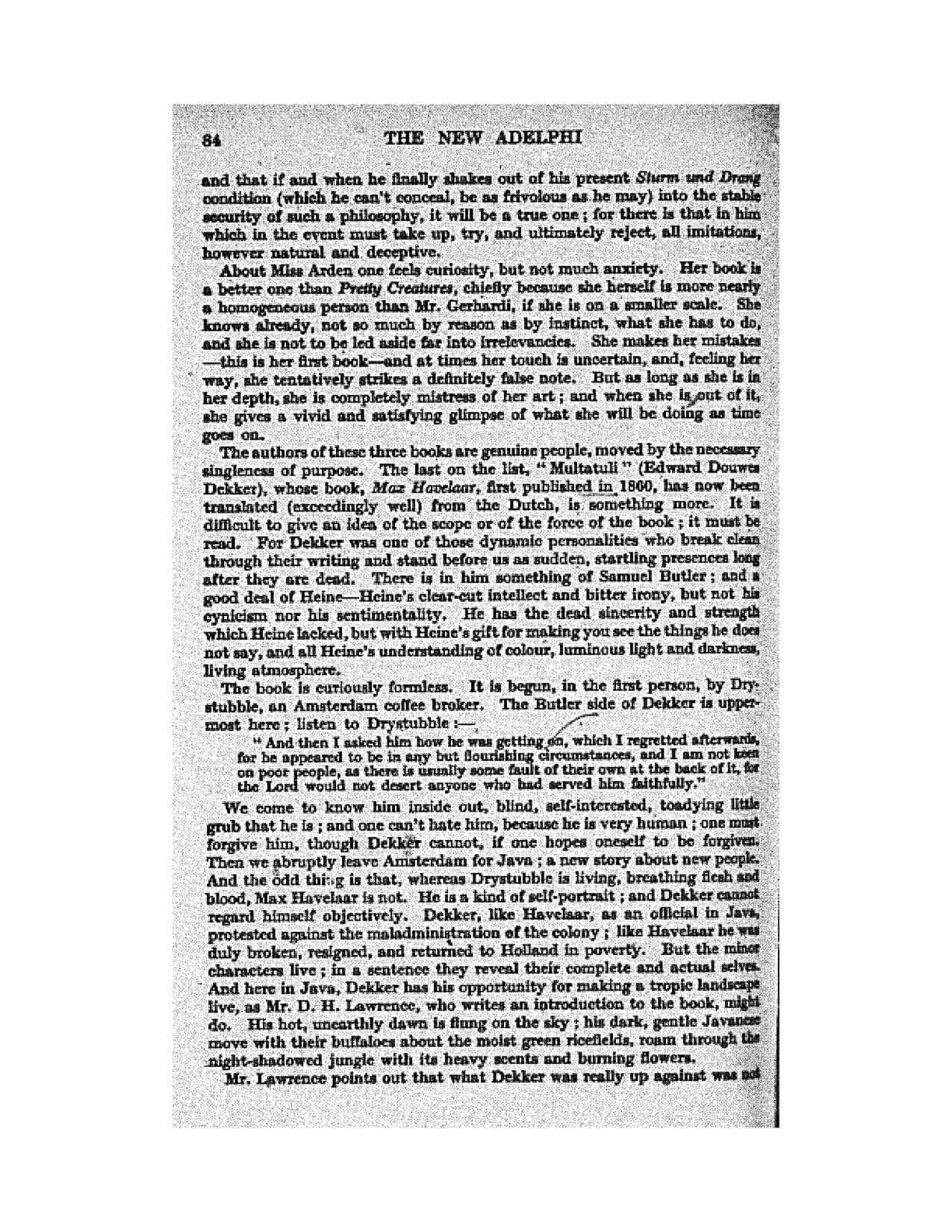
[next page]
and that if and when he finally shakes out of his present Sturm und Drang
condition (which he can’t conceal, be as frivolous as he may) into the stable
security of such a philosophy, it will be a true one; for there is that in him
which in the event must take up, try, and ultimately reject, all imitations,
however natural and deceptive.
About Miss Arden one feels curiosity, but not much anxiety. Her book is
a better one than Pretty Creatures, chiefly because she herself is more nearly
a homogeneous person than Mr. Gerhardi, if she is on a smaller scale. She
knows already, not so much by reason as by instinct, what she has to do,
and she is not to be led aside far into irrelevancies. She makes her mistakes
—this is her first book—and at times her touch is uncertain, and, feeling her
way, she tentatively strikes a definitely false note. But as long as she is in
her depth, she is completely mistress of her art; and when she is out of it,
she gives a vivid and satisfying glimpse of what she will be doing as time
goes on.
The authors of these three books are genuine people, moved by the necessary
singleness of purpose. The last on the list, “Multatuli” (Edward Douwes
Dekker), whose book, Max Havelaar, first published in 1800, has now been
translated (exceedingly well) from the Dutch, is something more. It is
difficult to give an idea of the scope or of the force of the book; it must be
read. For Dekker was one of those dynamic personalities who break clean
through their writing and stand before us as sudden, startling presences long
after they are dead. There is in him something of Samuel Butler; and a
good deal of Heine—Heine’s clear-cut intellect and bitter irony, but not his
cynicism nor his sentimentality. He has the dead sincerity and strength
which Heine lacked, but with Heine’s gift for making you see the things he does
not say, and all Heine’s understanding of colour, luminous light and darkness,
living atmosphere.
The book is curiously formless. It is begun, in the first person, by Drystubble,
an Amsterdam coffee broker. The Butler side of Dekker is upper-
most here; listen to Drystubble:—
“And then I asked him how he was getting on, which I regretted afterwards,
for he appeared to be in any but flourishing circumstances, and I am not keen
on poor people, as there is usually some fault of their own at the back of it, for
the Lord would not desert anyone who had served him faithfully.”
We come to know him inside out, blind, self-interested, toadying little
grub that he is; and one can’t hate him, because he is very human; one must
forgive him, though Dekker cannot, if one hopes oneself to be forgiven.
Then we abruptly leave Amsterdam for Java; a new story about new people.
And the odd thing is that, whereas Drystubble is living, breathing flesh and
blood, Max Havelaar is not. He is a kind of self-portrait; and Dekker cannot
regard himself objectively. Dekker, like Havelaar, as an official in Java,
protested against the maladministration of the colony; like Havelaar he was
duly broken, resigned, and returned to Holland in poverty. But the minor
characters live; in a sentence they reveal their complete and actual selves.
And here in Java, Dekker has his opportunity for making a tropic landscape
live, as Mr. D. H. Lawrence, who writes an introduction to the book, might
do. His hot, unearthly dawn is flung on the sky; his dark, gentle Javanese
move with their buffaloes about the moist green ricefields, roam through the
night-shadowed jungle with its heavy scents and burning flowers.
Mr. Lawrence points out that what Dekker was really up against was not






